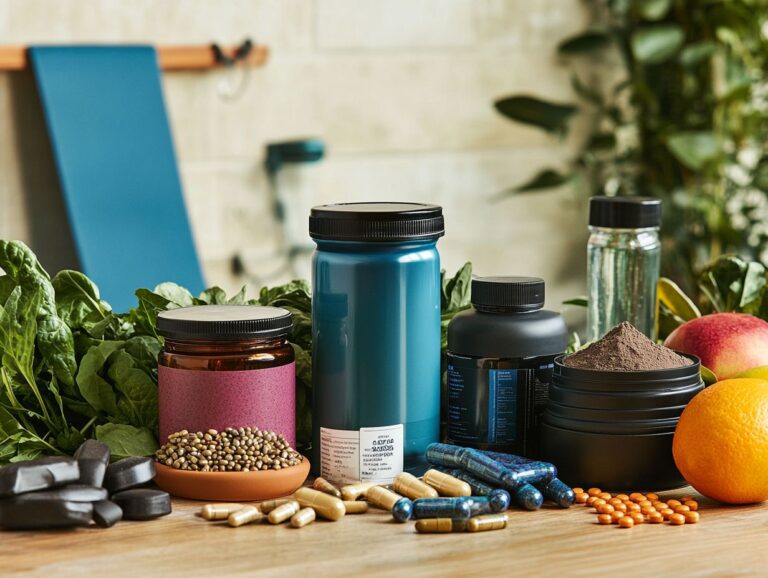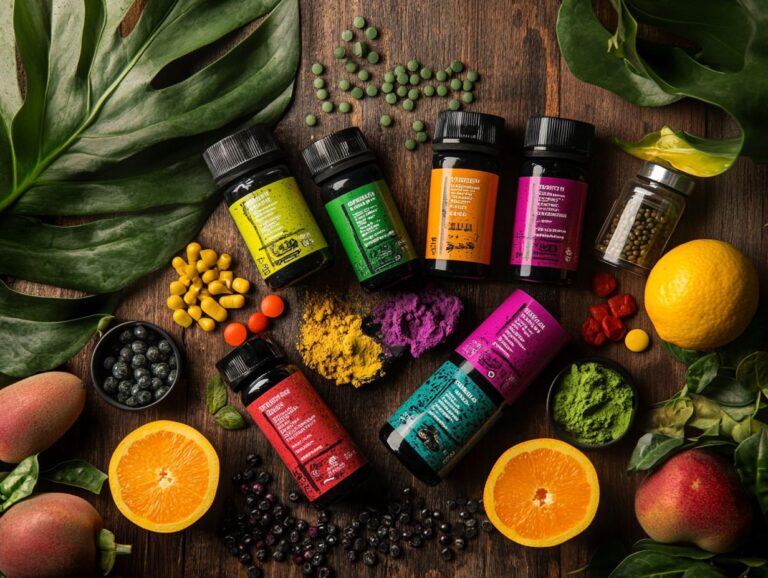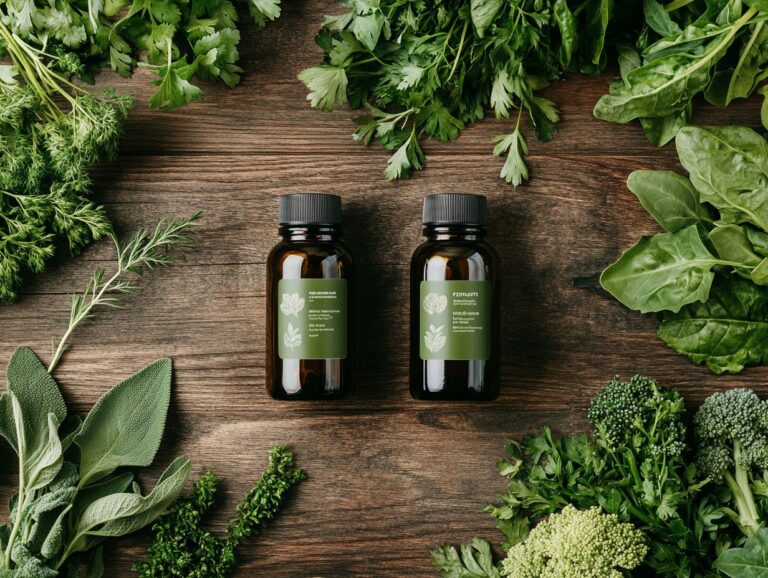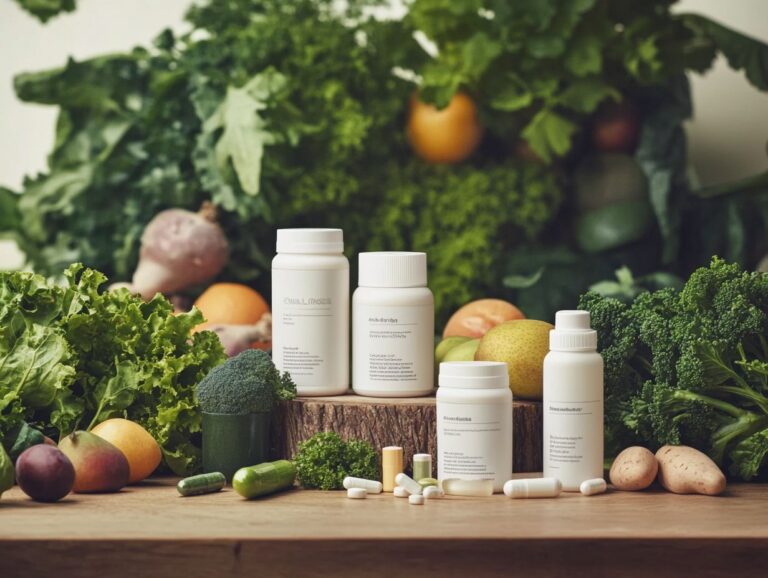Gut health is crucial for our overall well-being, influencing everything from digestion to immune system function. As more individuals adopt plant-based lifestyles, vegan gut health supplements, including products from brands like Seed DS-01 and Culturelle, have gained popularity as a way to enhance digestive health. This article explores the complexities of gut health, highlights its significance, and presents various types of vegan supplements, such as probiotics and prebiotics. Additionally, it provides guidance on how to choose the right health-promoting products and incorporate them into your diet for optimal wellness.
Key Takeaways:
- Vegan gut health supplements can improve digestion and overall wellness by providing the body with essential probiotics, prebiotics, and digestive enzymes.
- When choosing vegan gut health supplements, it is important to look for certifications, check for allergens and sensitivities, and consider the quality of ingredients, strains, and CFUs.
- Incorporating vegan gut health supplements, including fermented foods like yogurt and kimchi, into your diet can help maintain a healthy gut and prevent potential side effects, such as bloating or digestive discomfort.
What Is Gut Health?
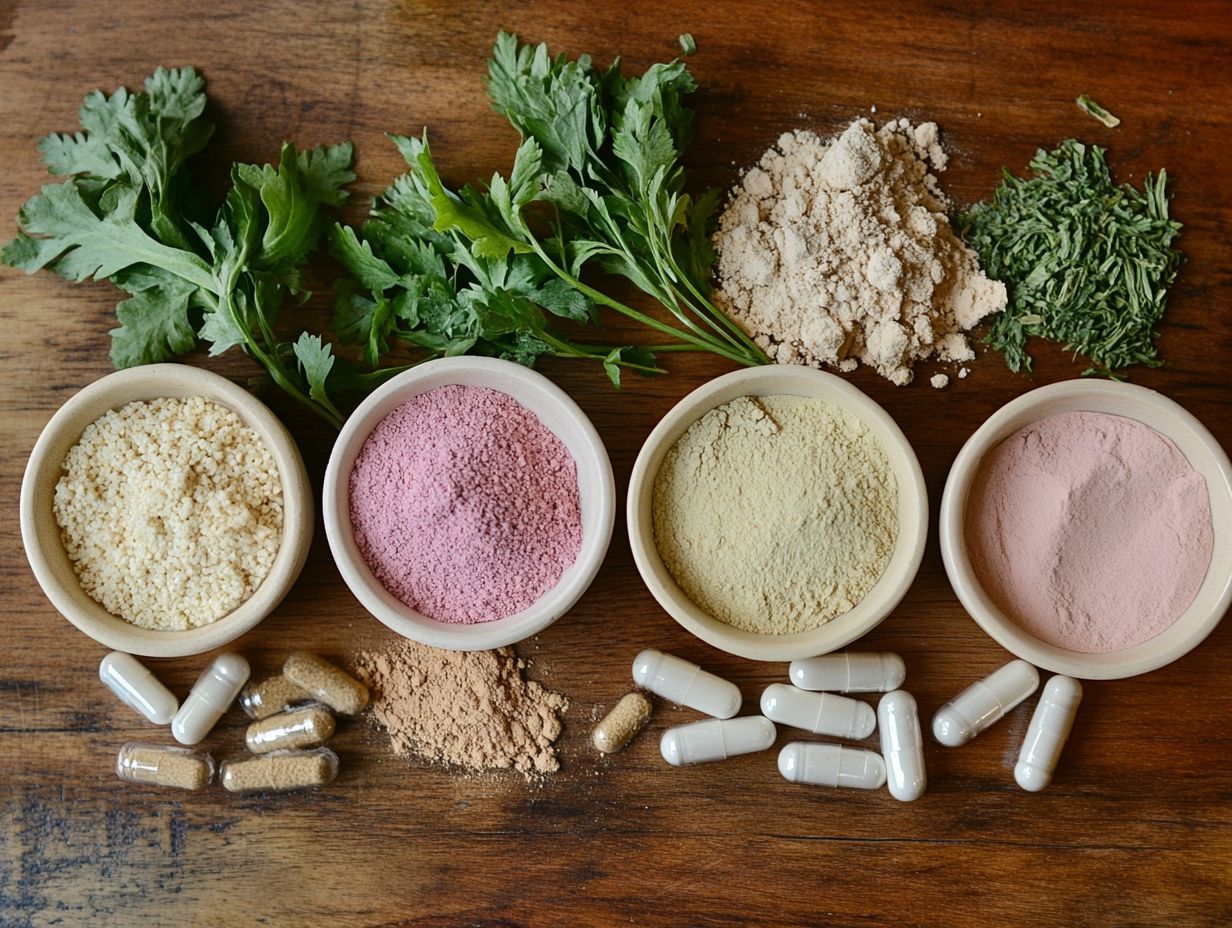 Gut health refers to the balance and function of microorganisms in the digestive tract, playing a crucial role in overall health and well-being, as supported by organizations such as the American Gastroenterological Association. It encompasses the harmony and activity of beneficial gut bacteria, such as Lactobacillus acidophilus and Bifidobacterium lactis, which are essential for healthy digestion, immune system function, and the prevention of digestive issues like constipation, diarrhea, and other gastrointestinal disorders. Registered dietitians like Shushy Rita Setrakian and Kristie Reed emphasize that maintaining good gut health is vital not only for gastrointestinal and immune health but also for the prevention of various gastrointestinal disorders.
Gut health refers to the balance and function of microorganisms in the digestive tract, playing a crucial role in overall health and well-being, as supported by organizations such as the American Gastroenterological Association. It encompasses the harmony and activity of beneficial gut bacteria, such as Lactobacillus acidophilus and Bifidobacterium lactis, which are essential for healthy digestion, immune system function, and the prevention of digestive issues like constipation, diarrhea, and other gastrointestinal disorders. Registered dietitians like Shushy Rita Setrakian and Kristie Reed emphasize that maintaining good gut health is vital not only for gastrointestinal and immune health but also for the prevention of various gastrointestinal disorders.
Why Is Gut Health Important?
Gut health is essential not only for digestion but also for supporting the immune system and overall well-being. A healthy gut facilitates nutrient absorption, regulates metabolism, and helps prevent digestive issues. Additionally, recent research, including clinical trials, indicates that a balanced gut microbiome plays a significant role in psychological health.
What Are Vegan Gut Health Supplements?
Vegan gut health supplements are products that combine probiotics, prebiotics, and digestive enzymes derived from plant-based sources, specifically formulated to support gut health and promote the health benefits associated with a balanced microbiome. These health-promoting supplements are essential for individuals following a vegan lifestyle who seek to enhance their gut microbiome naturally. Probiotics, such as those found in Seed DS-01, Culturelle, or Schiff Digestive Advantage, help populate the gut with healthy microorganisms. Prebiotics promote the growth of beneficial bacteria, while digestive enzymes aid in breaking down food and increasing nutrient absorption, ultimately supporting healthy digestion.
What Are Probiotics?
Probiotics are live microorganisms that resemble the beneficial microbes found in the human gut, and they are believed to enhance gut health when consumed in adequate amounts. Probiotic strains such as Lactobacillus acidophilus and Bifidobacterium lactis are thought to restore gut microbial flora disrupted by poor diet, stress, or antibiotic use. Clinical trials have demonstrated that these probiotics can reduce gastrointestinal symptoms and improve overall gut health. They primarily function through competitive exclusion, where healthy bacteria compete with pathogenic bacteria for resources, and by enhancing the mucosal barrier to prevent leaky gut syndrome. For instance, Saccharomyces boulardii may help reduce antibiotic-associated diarrhea, while Lactobacillus rhamnosus GG has shown potential benefits for individuals with irritable bowel syndrome (IBS) and inflammatory bowel disease (IBD). Numerous clinical studies and trials consistently indicate that the use of probiotics not only improves gut health but may also enhance immune function and reduce inflammation, suggesting that probiotics and prebiotics can serve as a proactive approach to promoting gut health.
What Are Prebiotics?
Prebiotics are non-digestible fibers that serve as a food source for healthy gut bacteria, promoting the growth and activity of these beneficial microorganisms. They play a significant role in enhancing the microbiome, which is essential for gut and digestive health, both of which are necessary for optimal immune system function. These compounds help create an environment where probiotics can thrive, contributing to overall gut balance. Consuming prebiotic-rich foods, including fermented foods like yogurt and kimchi, supports beneficial bacteria and is vital for preventing the growth of harmful microbes. Common sources of prebiotics include a variety of foods and fermented foods, such as:
- fermented products
- whole grains
- bananas
- asparagus
- garlic
By fostering a mutually supportive relationship between prebiotics and probiotics, digestive health can be optimized, leading to better nutrient absorption and an overall enhanced sense of well-being, as emphasized by health experts like Rich Scherr and organizations like Verywell Health.
What Are Digestive Enzymes?
 Digestive enzymes are proteins that play a crucial role in breaking down food into nutrients that the body can absorb. They are essential for gut health, as they facilitate digestion and nutrient absorption. While the body naturally produces these enzymes, many individuals find digestive enzyme supplements beneficial, particularly those who experience digestive issues or follow restricted diets. These supplements can be especially helpful for people with conditions such as lactose intolerance or celiac disease, where certain food components are not properly digested. By supplementing with additional enzymes, individuals can alleviate discomfort, gas, and bloating associated with these conditions. Furthermore, those on restrictive diets may use enzyme supplements to expand their food options without experiencing adverse effects, ultimately enhancing their overall nutrition. In summary, digestive enzymes support the body’s natural processes and can significantly improve the quality of life for people with dietary limitations.
Digestive enzymes are proteins that play a crucial role in breaking down food into nutrients that the body can absorb. They are essential for gut health, as they facilitate digestion and nutrient absorption. While the body naturally produces these enzymes, many individuals find digestive enzyme supplements beneficial, particularly those who experience digestive issues or follow restricted diets. These supplements can be especially helpful for people with conditions such as lactose intolerance or celiac disease, where certain food components are not properly digested. By supplementing with additional enzymes, individuals can alleviate discomfort, gas, and bloating associated with these conditions. Furthermore, those on restrictive diets may use enzyme supplements to expand their food options without experiencing adverse effects, ultimately enhancing their overall nutrition. In summary, digestive enzymes support the body’s natural processes and can significantly improve the quality of life for people with dietary limitations.
How Do These Supplements Improve Digestion and Wellness?
Supplements like probiotics, prebiotics, and digestive enzymes are essential for improving digestion and overall wellness by promoting a balanced gut microbiome and enhancing nutrient absorption, with products like Ritual Synbiotic+ and AG1 being popular choices. Probiotics introduce beneficial microorganisms into the gut, while prebiotics serve as nourishment for these bacteria, supporting their growth. Additionally, digestive enzymes aid in the efficient breakdown of food, ensuring that nutrients are effectively absorbed into the body. This process ultimately leads to various health benefits, including improved immune function, as highlighted by the American Gastroenterological Association.
How Do Probiotics Improve Gut Health?
Probiotics enhance gut health by restoring the balance of gut bacteria, which is essential for optimal digestive function. Strains such as Lactobacillus acidophilus inhibit the growth of harmful bacteria, reduce inflammation, and alleviate symptoms related to digestive issues, creating a more resilient gut environment. By improving the gut microbiome, these beneficial microorganisms also increase the production of short-chain fatty acids, which play a crucial role in maintaining gut barrier integrity. Research indicates that individuals consuming probiotics report a 40% reduction in bloating and gas symptoms, attributed to the modulation of gut motility and the breakdown of dietary fibers. Moreover, studies have shown that certain probiotic strains can significantly relieve the symptoms of irritable bowel syndrome (IBS); one clinical trial found that nearly 70% of participants experienced relief from abdominal pain after taking a specific blend of probiotics for eight weeks. This growing body of evidence supports the multifaceted benefits that probiotics offer in promoting not only gut health but also overall well-being.
How Do Prebiotics Improve Gut Health?
Prebiotics enhance gut health by serving as a food source for beneficial bacteria and promoting their growth and activity in the gastrointestinal tract. By increasing the population of healthy gut bacteria, prebiotics improve digestion, boost immune responses, and may lower the risk of gastrointestinal disorders. These non-digestible fibers, found in foods such as bananas, onions, garlic, and asparagus, play a critical role in maintaining a healthy microbiome. When ingested, prebiotics are fermented in the colon, resulting in the production of short-chain fatty acids that provide energy for gut cells and stimulate overall digestive function. Additionally, a varied diet rich in high-fiber foods helps regulate bowel movements and reduces inflammation by nourishing beneficial bacteria, creating a healthier gut environment. Incorporating these fiber-rich options into daily meals can significantly enhance gut health, as supported by clinical trials and research.
How Do Digestive Enzymes Improve Gut Health?
Digestive enzymes play a crucial role in improving gut health by breaking down food particles into nutrients that are easily absorbed by the body, thereby enhancing overall digestive efficiency. By lightening the workload of the digestive system, these enzymes can help reduce symptoms such as bloating, gas, and discomfort associated with suboptimal digestion. Plus alleviating these symptoms, digestive enzymes aid in nutrient absorption, ensuring that the body receives the bioavailable vitamins and minerals it needs to support overall health benefits. This is particularly important for individuals following specific diets, such as gluten-free or dairy-free, where enzyme replacement therapy may help mitigate the digestive challenges that arise. In such cases, digestive enzymes can improve gut health by enhancing digestion and nutrient absorption that might not have been achieved otherwise.
What Are the Best Vegan Gut Health Supplements?
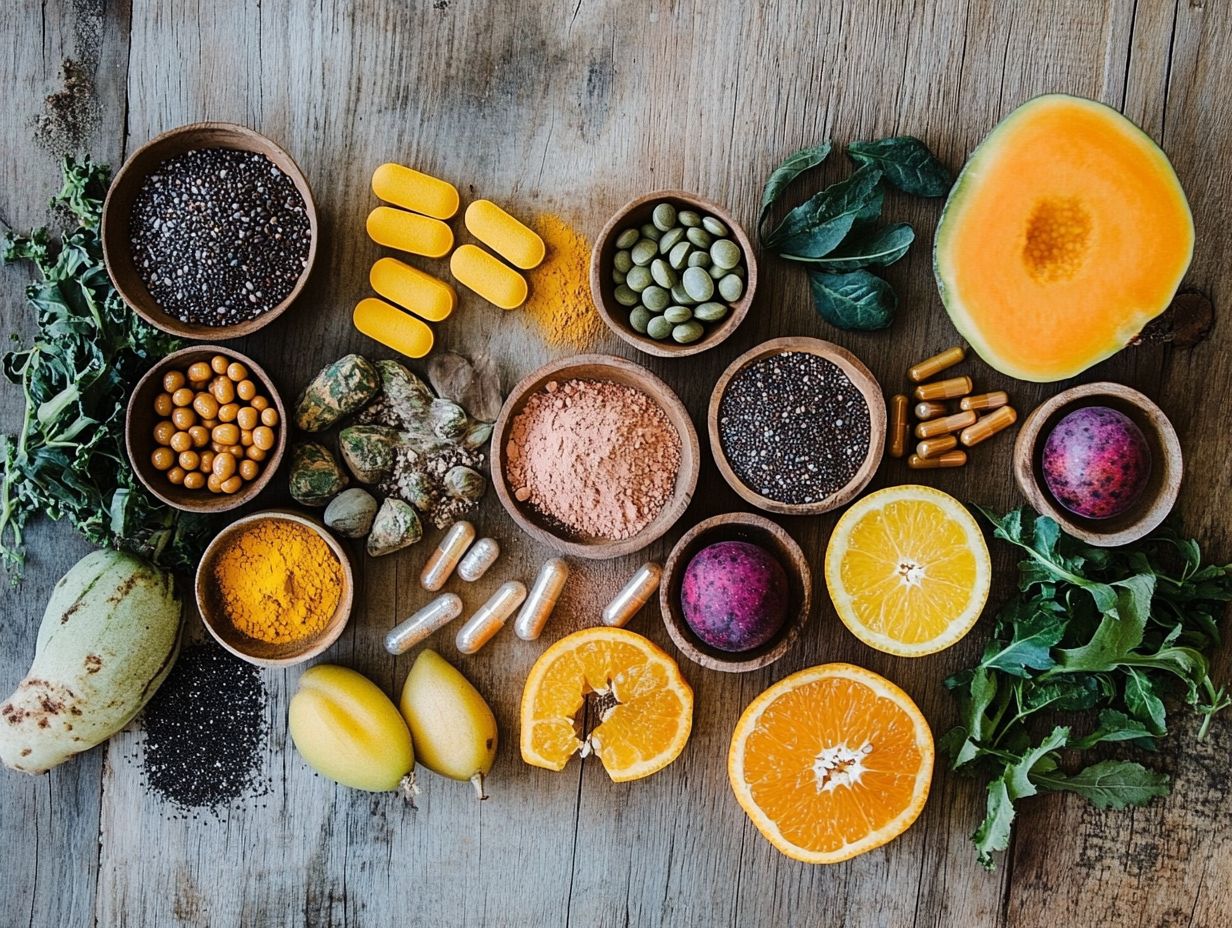 Popular options for vegan gut health supplements include Now Probiotic, Natures Bounty, and Garden of Life, all of which offer a variety of probiotic strains to support gut health. The best vegan gut health supplements feature powerful probiotics, prebiotics, and digestive enzymes that promote optimal digestive function and overall well-being. Brands like Natures Bounty and Culturelle offer these supplements in convenient capsules. Products such as Now Probiotic, Garden of Life, Ritual Synbiotic+, and Seed DS-01 are specifically designed to deliver targeted strains that enhance gut microbiome balance, providing significant health benefits for individuals following a vegan diet.
Popular options for vegan gut health supplements include Now Probiotic, Natures Bounty, and Garden of Life, all of which offer a variety of probiotic strains to support gut health. The best vegan gut health supplements feature powerful probiotics, prebiotics, and digestive enzymes that promote optimal digestive function and overall well-being. Brands like Natures Bounty and Culturelle offer these supplements in convenient capsules. Products such as Now Probiotic, Garden of Life, Ritual Synbiotic+, and Seed DS-01 are specifically designed to deliver targeted strains that enhance gut microbiome balance, providing significant health benefits for individuals following a vegan diet.
1. Probiotic Supplements
The best probiotic supplements introduce healthy bacteria into the gut. Among the most popular strains found in probiotics are Lactobacillus acidophilus, Bifidobacterium lactis, and Lactobacillus rhamnosus. These supplements can enhance gut health, improve digestion, and support immune function, making them valuable additions to a vegan diet. Probiotic supplements work by replenishing the body’s natural microbiota, which can be disrupted by various factors such as poor diet, stress, and the use of antibiotics. The American Gastroenterological Association endorses the careful use of probiotic supplements to optimize gut health. The most effective probiotic supplements typically contain multiple strains, each offering specific benefits. For instance, Lactobacillus rhamnosus is particularly effective in shortening the duration of respiratory infections, while Saccharomyces boulardii is helpful in treating diarrhea. Brands such as AG1 and Schiff Digestive Advantage offer formulations rich in these beneficial strains. Although dosages can vary, experts generally recommend selecting products that contain at least 10 billion CFUs (colony-forming units) to ensure adequate support. Some supplements even offer much higher CFUs, providing enhanced benefits for those with specific needs like IBS and IBD.
2. Prebiotic Supplements
Prebiotic supplements are dietary fiber sources that nourish healthy gut bacteria, promoting their growth and enhancing overall gut health. These supplements are particularly beneficial for individuals who do not consume enough dietary fiber, as they aid digestion and support a healthy microbiome. Various types of prebiotic supplements are available, including inulin, oligofructose, and resistant starch, all of which provide essential nutrition for beneficial gut bacteria. Inulin, derived from chicory root, is known to promote the growth of lactobacilli, while resistant starch, found in certain grains and legumes, helps improve satiety and further supports digestive health. Experts such as Shushy Rita Setrakian and Kristie Reed have highlighted the importance of incorporating prebiotics like inulin into a balanced vegan diet. Regular consumption of prebiotics can enhance gut motility, reduce bloating, and increase nutrient absorption. Brands like Benefiber and NutraBlast offer a wide variety of prebiotic supplements, ensuring that individuals have ample options to meet their digestive health needs.
3. Digestive Enzyme Supplements
Digestive enzyme supplements are beneficial for breaking down food, improving nutrient absorption, and alleviating digestive problems. They are particularly helpful for individuals with dietary restrictions or those who experience digestive discomfort, as they can support overall gut health. These supplements contain various types of enzymes, including proteases, lipases, and amylases, which assist in breaking down proteins, fats, and carbohydrates, respectively. For example, lactase supplements can be advantageous for lactose-intolerant individuals, as they help break down lactose, the sugar found in dairy products. Additionally, digestive enzymes containing proteases may be beneficial for those on a high-protein diet, as they aid in protein breakdown, potentially improving energy levels and reducing bloating. When selecting digestive enzyme supplements, it is important to consider the source of the enzymes, dosage recommendations, and specific dietary needs.
How to Choose the Right Vegan Gut Health Supplements?
When selecting vegan gut health supplements, it is important to consider several factors, including potential allergens, the CFUs (colony-forming units) of probiotics, and the quality of the ingredients. Always read product labels carefully and choose reputable brands that prioritize transparency and efficacy in their health-promoting products.
1. Look for Vegan Certification
 When selecting vegan gut health supplements, it is important to choose products that are certified vegan. This certification guarantees that the supplements do not contain any animal-derived ingredients, allowing consumers to be confident that the products align with their values. Additionally, certified vegan supplements provide the necessary health support that consumers seek.
When selecting vegan gut health supplements, it is important to choose products that are certified vegan. This certification guarantees that the supplements do not contain any animal-derived ingredients, allowing consumers to be confident that the products align with their values. Additionally, certified vegan supplements provide the necessary health support that consumers seek.
2. Check for Allergens and Sensitivities
Allergen and sensitivity checks are crucial when selecting vegan gut health supplements. Many individuals follow specific diets that can impact their overall health. Products that are clearly labeled with allergen information help to prevent health issues and promote safety. It is essential to recognize that different supplements may contain hidden allergens, so a careful review of the ingredient list is recommended. Reading labels can not only reveal potential allergens but also help identify additives that may cause digestive discomfort. Being aware of common allergens, such as gluten, soy, nuts, and dairy, is beneficial when evaluating these products. Additionally, choosing certifications like ‘gluten-free’ or ‘non-GMO’ can provide an extra level of assurance.
3. Consider the Strains and CFUs of Probiotics
When evaluating vegan gut health supplements, two crucial factors to consider are the specific probiotic strains included in the formulation and their CFUs (colony-forming units), which indicate the strength of the supplements. The wide variety of probiotic strains available offers numerous health benefits, so understanding their functions is essential in selecting the vegan gut health product that will be most effective for you. For instance, Lactobacillus and Bifidobacterium are among the most well-researched probiotic strains, particularly recognized for their roles in improving digestion and enhancing immune function. Higher CFU counts typically above 10 billion CFUs per dose may suggest greater efficacy, especially for individuals with digestive issues. Certain strains, such as Lactobacillus rhamnosus GG, have been shown to effectively relieve symptoms of irritable bowel syndrome and support a balanced gut flora. When considering a supplement, it is important to recognize that success is not solely determined by quantity; the quality and specific strains of probiotics also play a significant role in the overall health results achieved.
4. Look for Quality Ingredients
The significance of high-quality ingredients in vegan gut health supplements lies in their ability to ensure both safety and efficacy. Supplements made with higher-quality ingredients are more likely to deliver the benefits they claim to support. Publications from Verywell Health and experts like Rich Scherr emphasize the critical role of ingredient transparency and quality in selecting effective supplements. In a crowded marketplace where misleading labels can confuse consumers, it is crucial to research the quality of ingredients. Consumers should seek gut health supplements that clearly outline their testing and sourcing practices. Third-party testing is a positive indicator, as it demonstrates that the products have been evaluated for potency and safety. Additionally, consumers should avoid products containing artificial flavors, colors, preservatives, fillers, or excessive amounts of sugar, as these can have harmful effects. Choosing products that are rich in prebiotics, probiotics, and fiber from reputable brands is essential for maintaining a healthy and thriving gut microbiome, which is vital for overall health.
What Are the Potential Side Effects of Vegan Gut Health Supplements?
Vegan gut health supplements can potentially cause side effects, particularly in individuals who already have digestive issues or sensitivities. Common side effects may include bloating, gas, or changes in bowel movements, underscoring the importance of consulting a healthcare professional before starting any new supplement regimen. Individual responses to vegan gut health supplements can vary significantly, as research indicates that factors such as genetics, diet, and overall health play crucial roles in the body’s ability to digest and absorb nutrients. For instance, a supplement that alleviates gastrointestinal discomfort for one person may cause discomfort for another, especially if they are unaware of the need to adjust their fiber intake. This highlights the importance of being mindful of how one s body reacts to supplements and keeping a record of any symptoms or changes. Additionally, regular communication with healthcare providers is essential, as it allows for the prompt addressing of any side effects and the development of a customized supplement plan that supports gut health without compromising overall well-being.
How to Incorporate Vegan Gut Health Supplements into Your Diet?
Using vegan gut health supplements is an effective way to enhance your overall health and digestive wellness. Start by determining your dietary needs and identifying which types of supplements such as prebiotics, probiotics, and digestive enzymes can best address those needs. Additionally, consider how to seamlessly incorporate them into your daily routine, taking into account factors like whether capsules or powders fit better into your lifestyle. To maximize the benefits of these vegan dietary supplements, pay attention to when to take them. Some probiotics are most effective on an empty stomach, while others work better when consumed with food. It is important to adhere to the optimal dosage as specified on the supplement label. Consistency is key. Taking supplements regularly alongside fiber-rich foods can enhance their effectiveness. For instance, ingesting probiotics with fruits and vegetables fosters an environment conducive to the growth of beneficial gut bacteria. This practice not only aids digestion but also improves overall nutrient absorption, leading to significant enhancements in gut health.

